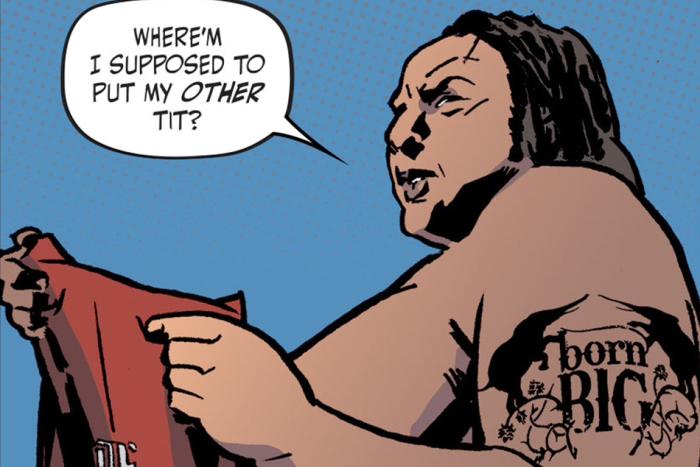In Nathaniel Hawthorne’s short story Young Goodman Brown, a Puritan man yields to a dark night of the soul, following a charming devil into a forest containing evils previously unknown. There, he witnesses the pillars of his community—stalwart Christians all of them—performing a Satanic rite by firelight. Returning to his wife, (who was also a participant in the evil spectacle) Goodman Brown cannot shake what he may or may not have seen, resigning himself to a life of embittered faithlessness.
Brooklyn-based writer and n+1 associate editor Richard Beck is closest to the devil in Hawthorne’s allegory: a supplier of dark visions that contain as much truth as they do hysterical projection. In his just-released debut book, We Believe the Children, Beck spent nearly four years amassing the history of a moral panic—centering on the landmark 1984 McMartin Preschool case, where teachers were falsely accused and charged with hundreds of counts of sexual abuse, pornography, and ritual torture. Dragging on for years, the case devastated countless lives in the previously comfortable community of Manhattan Beach, California.
Beck treats McMartin as a way into a larger trend: the 20th century witch-hunt (as imagined by Bret Easton Ellis), with accusations of perversion and Satanism sweeping the nation. No one was safe—preschools, daycares, babysitters, and YMCAs alike. Any adult-child relation appeared treacherous outside of the traditional family model. With a microscopic eye for detail, Beck conveys both the judicial failure and social hysteria that dogged these cases—the clumsily executed due diligence that led to wrongful convictions and mass public humiliation.
Here, Beck talks about how this (occasionally comic) drama played out beat-by-beat, and why the story is vital 30 years after the panic began.
*
I read most of your book in public, and sometimes I'd look at the people around me and think, You have no idea, the darkness in your soul. What inspired you to pursue this particular moment in U.S. history?
In fall of 2011, n+1 had a research group—about 10 of us working on long-term projects together. We did one on the legacy of second-wave radical feminism, and I got really interested in why the women's movement broke down over the course of the ’80s. At the end of the ’70s, women's liberation was very controversial, but it had an enormous amount of momentum—it was the most powerful cultural, political, and intellectual movement happening in the U.S. at the time. Then by the early ’90s, you'll have a New York Times Magazine story where they were interviewing women college students on campuses, and they're saying things like, "I would never want to be a feminist—I'm not a hairy man-hater." My own particular interest was in how this powerful current of political energy disintegrated; how it was confronted in ways that turned out to be pretty effective.
Was there one case in particular that caught your attention?
After I saw Capturing the Friedmans and read about the McMartin preschool case, I found a journalist, Debbie Nathan, who spent a lot of the ’80s reporting on these cases and wrote a book about the panic in the ’90s [Satan’s Silence]. She lived in Manhattan at the time, so I met with her. I was under the impression that there were a few cases—a misconception that she disabused me of.
A misconception in that there were many cases?
Yes. I thought it was McMartin and the Friedmans and a couple of others, but she said "No, this was a pervasive thing, it was all over the country for an entire decade." That was pretty much when I decided to make it [a larger project]. There were so many cases, and yet I had never heard of any of them. I would talk to people, friends of mine over the age of 35, they'd say, "Oh yeah, I remember McMartin." But people under that age—they'd think I was joking. The extent to which these cases had been forgotten as general public historical knowledge made me very interested, even a little suspicious, right away.
Suspicious how?
For these cases—which had been such big news in the ’80s—to be forgotten suggested that whatever cultural or political dynamics produced them had not been addressed. It was still a very uncomfortable topic, otherwise we would know about it.
So you feel it was more of a conscious erasure.
To the extent that those kinds of choices about public, political memory can be made consciously—sure.
In the period of primary research, you spoke to journalists and psychologists and lawyers—did you speak to any of the people who were directly involved in the cases as victims or accused participants? Or was that something you stayed away from?
I spoke to a few, but a lot of people didn't want to talk to me about it, which was understandable. A few months into the research, I did make a conscious choice to base it more on archival material than on in-person interviews. People's reactions were so much more immediate—the things they said to journalists at the time as it was happening. It seemed much more vivid in terms of helping me to narrate what it was like to experience those cases as they occurred. That decision was also motivated in part by the [Randy Shilts] book And The Band Played On, which was the first [written] history of the AIDS epidemic. Part of what I liked about it was the way that it narrated the crisis with this ruthless chronological quality. Here's what happened this week, and here's what happened this week, and you just watch an avalanche of errors unfolding, day-by-day. That was a quality I wanted my own book to have, which meant that I needed to stay rooted in the time period as it was happening.
In the introduction, you write that you were interested in making a coherent historical record rather than an investigative report, which I assume requires a certain amount of neutrality. Was it ever overwhelming—less so as a journalist, but as a person?
Some cases were harder to research than others, a case like the McMartin trial went on for long enough and had enough of a comedy of errors quality, so there were parts that registered as being actually quite comic. Like when Mr. T is trying to get admitted into the courtroom. I tried to get some of that into the book because I think they registered as kind of absurd and comic at the time.
Sexual abuse is seen as coming from outside the family, and threatening the family. Whereas everyone knows that physical abuse and neglect happens within the family. It's parents who fail to feed their kids sufficiently.
There’s a lot of colour to the proceedings, that’s for sure.
Some cases were harder to read about, because they move very quickly, and there wasn't a lot of interesting ancillary stuff. Then you just have someone who clearly didn't commit the crimes that they're charged with get sent off to prison for 20 to 25 years.
So you felt doubtless that certain people were completely innocent?
Yes. With some of these cases, part of the tragedy of the way these investigations were carried out is that there really is a limited window after a crime has been committed where it's possible to investigate what happened and find out what really took place. And it's also true that if you botch parts of that investigation—if you conduct it irresponsibly—there's certain details that become irrecoverable. So some of these cases, I think there's a decent chance that we'll never know exactly what occurred.
Are you thinking of Ray Buckey [one of the alleged ringleaders] at McMartin?
No, I feel very confident that everyone associated with the McMartin trial is completely innocent. I don't have any doubt about the McMartin trial.
You maintain a pretty objective position throughout the book.
I wanted to narrate it in a bit of a neutral way because at the time it seemed very uncertain. When you're writing retrospectively about people who were wrongly accused or convicted of crimes, it's very easy to adopt this position of outraged innocence, to say, "Well, if this were to happen in my community, where I live, I would obviously see through this ridiculous prosecution."
You can see yourself taking different positions?
If I were living in Manhattan Beach [where the McMartin preschool case occurred], and news stories started coming out, I don’t know that I would immediately say, "Of course they're obviously all innocent." I don't have access to the reports, I don't have access to the interview transcripts. There's this idea that people who get caught up in hysteria are somehow dupes, in a way that you and me and all of our friends aren't. I don't think that's how it works.
Something I did take away from it is that we are all capable of being caught up in some kind of hysteria. The writing is—if not sympathetic to all points of view—curious to hear them all out.
In the case of the McMartin trial, there were these people who thought that the teachers had abused these kids, and then there were people who thought that it was a witch-hunt. That was more true, those people were right. While it's true that in some other cases, the people who say this is a witch-hunt have political motivations of their own, I don't think the truth is totally unknowable.
It’s not so distinct as we often want guilt or innocence to be.
Even in cases where there's evidence that something may have taken place to prompt the initial allegation, it's also still obviously true that the people charged were grossly overcharged and convicted of crimes they didn't commit. Even if it seems plausible that they committed some crime—that's also a witch-hunt. If someone molests two children, and then is convicted of serially raping 15 children over a period of years, that's a witch-hunt too.
Why do you think these cases are relevant now?
The hysteria that happened in the ’80s? That's gone away. We don't have daycare workers charged with being Satan-worshiping child abusers. However, there is this pervasive cultural fear about the sexual dangers that the world poses to children, and I think those fears are in excess of the reality. You look at all the relevant statistics, and in fact it seems that children in the U.S. are safer today than they have been in many decades.
And how does that fear reveal itself in 2015?
There's a part at the end of the book where I talk about women who in the last few years have been arrested and charged with child neglect for allowing their kids to play alone in parks. When police officers talk about why those parents should've been arrested, they say it’s because you can't let your kids play alone in the park—there are pedophiles around. I think that fear specifically came out of the ’80s, and I don't think that it has lessened particularly over the past 25 years.
Do you read group social responses differently—the responses to explosive or contestable events?
Maybe so. People pay attention to stories of sexual abuses of power because they are, of course, newsworthy, and of course the people who committed those abuses should be held accountable. But there's also an element of prurience in how people respond to them. The sexual abuse of prepubescent children receives so much more attention than the physical abuse or neglect of prepubescent children, and is thought of as much more devastating than physical abuse or negligence. In fact, physical abuse and neglect are much more common and can be just traumatizing as sexual abuse. That part of the effort of the book was to relearn how to see sexual abuse on a continuum with other kinds of child mistreatment.
Why do you think we prioritize certain kinds of abuse?
The fantasy about child sexual abusers is that they're in alleyways, or cruising by elementary schools in a van. Sexual abuse is seen as coming from outside the family, and threatening the family. Whereas everyone knows that physical abuse and neglect happens within the family. It's parents who fail to feed their kids sufficiently.
So it's easier to estrange those abusers.
Even though sexual abuse of children is frequently committed by family members, we've come up with a narrative that allows us to see child sexual abuse as coming from outside and threatening the family, which we can't do with physical abuse and neglect. I liked [writing about] recent history because it's close enough that you can still feel the relevance, just because of the way that everyone grows up and is socialized. There’s this kind of instinctive, "Oh, okay, right, that's where this part of my political experience comes from, that's where this cultural dynamic that I felt comes from." But in writing this book, I also wanted to gently push the panic back into the past a little bit and make it seem like an isolated historical thing. It should be possible to think about it in a slightly detached way. It might be aspirational, but part of the effort of the book is to say: what if we aspired to treat these events as if they were a little more resolved than they were. What kind of insight would that make it possible to get?






